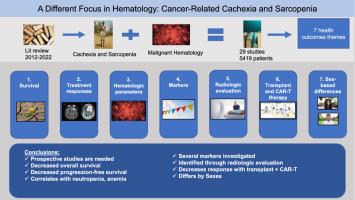An integrative review of cancer-related cachexia and sarcopenia: A different focus in malignant hematology
引用次数: 0
Abstract
Introduction/background
An improved understanding of cancer-related cachexia and sarcopenia among patients with hematologic malignancies can improve their health outcomes. Patients with hematologic malignancies are affected by cancer-related cachexia and sarcopenia, but this aspect of their care is rarely studied. This review aims to increase awareness and knowledge of cancer-related cachexia and sarcopenia for patients with hematologic malignancies through a comprehensive synthesis of current research.
Methods
An integrative literature review was conducted according to the Preferred Reporting Items for Systematic Reviews and Meta-Analyses. Ovid MEDLINE, CINAHL Complete, Embase, and Web of Science databases were searched for studies published between 2012 and 2022 using search terms of hematologic malignancies and cancer-related cachexia or sarcopenia.
Results
Twenty-nine studies were examined with data on 5,687 patients, primarily diffuse large B-cell lymphoma.
Conclusion
The results are grouped by themes identified in the studies of cancer-related cachexia and sarcopenia in hematologic cancers. The major themes identified were health outcomes, patient identification, transplant effects, and sex differences. Cancer-related cachexia and sarcopenia are associated with decreased overall survival and progression-free survival, similar to solid tumors. Cancer-related cachexia and sarcopenia reduce tolerance to chemotherapy and increase hematologic toxicities. With this effect, biomarkers and cachexia prognostic scores are available to improve patient identification, prognostication, and support. These affected individuals will benefit from increased awareness by the healthcare team to tailor care and mitigate the deleterious effects of the condition.

癌症相关恶病质和肌肉疏松症综合综述:恶性血液病的不同焦点
导言/背景加深血液恶性肿瘤患者对癌症相关恶病质和肌肉疏松症的了解,可改善他们的健康状况。血液系统恶性肿瘤患者会受到癌症相关恶病质和肌肉疏松症的影响,但有关这方面的研究却很少。本综述旨在通过对当前研究的全面综述,提高血液恶性肿瘤患者对癌症相关恶病质和肌肉疏松症的认识和了解。采用血液系统恶性肿瘤和癌症相关恶病质或肌肉疏松症为检索词,检索了 Ovid MEDLINE、CINAHL Complete、Embase 和 Web of Science 数据库中 2012 年至 2022 年间发表的研究。主要研究主题包括健康结果、患者识别、移植影响和性别差异。癌症相关恶病质和肌肉疏松症与总生存率和无进展生存率下降有关,这一点与实体瘤类似。癌症相关恶病质和肌肉疏松症会降低化疗耐受性,增加血液毒性。在这种影响下,生物标记物和恶病质预后评分可用于改善患者识别、预后和支持。医护团队提高对恶病质的认识,为患者提供有针对性的护理,减轻恶病质的有害影响,将使这些患者受益匪浅。
本文章由计算机程序翻译,如有差异,请以英文原文为准。
求助全文
约1分钟内获得全文
求助全文
来源期刊

Health sciences review (Oxford, England)
Medicine and Dentistry (General)
自引率
0.00%
发文量
0
审稿时长
75 days
 求助内容:
求助内容: 应助结果提醒方式:
应助结果提醒方式:


